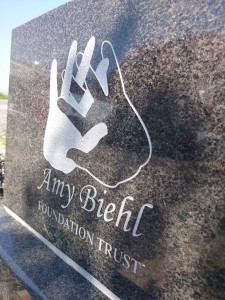February 11, 2015 will mark the 25th anniversary of Nelson Mandela’s release from prison in South Africa. Upon his release, Mandela worked to dismantle South Africa’s state-sponsored system of racial segregation—apartheid. The following story of brokenness and transformation is set in post-apartheid South Africa, and offers a new perspective on the death penalty.
In 1992, Stanford University graduate student Amy Biehl received a Fulbright fellowship to conduct research in South Africa, related to post-apartheid public policy. Over the next year, Amy, who was white, lived in close contact with many black South Africans from black townships.
It was a tragic case of being in the wrong place at the wrong time.
Amy worked to bring about full participation for blacks in South Africa’s governance structure—a move promised by the new constitution. In late August, 1993, as Amy was concluding her research and preparing to return to California, she was attacked by a mob of young black residents from the township of Guguletu. Amy was hit by a brick, then dragged from her car, beaten, and stabbed to death. Fueled by the horrific memories of the atrocities perpetrated by whites in South Africa under apartheid, Amy’s killers only saw the color of her skin. It was a tragic case of being in the wrong place at the wrong time.
After Amy’s death, her family received hundreds of letters of consolation from many local black women with whom Amy had worked, as well as correspondence from national leaders such as Nelson Mandela and Archbishop Desmond Tutu.
Eventually, four young men were arrested and put on trial for Amy’s death. Since the crime was committed during a political demonstration, and had not been a premeditated murder, the young men were sentenced to a lengthy prison term rather than life in prison.
In 1996, in an effort to heal the wounds of apartheid, Nelson Mandela established the Truth and Reconciliation Commission—headed by Archbishop Desmond Tutu. Amy’s story became part of the Commission’s work. Peter and Linda Biehl, Amy’s parents, flew to South Africa to see what their daughter had loved so deeply in the lives of the people she encountered there.
Face to face with the four young convicted killers, the Biehls dramatically and graciously spoke words of forgiveness.
During their visit, the Biehls came to better understand the context surrounding their daughter’s murder. Face to face with the four young convicted killers, the Biehls dramatically and graciously spoke words of forgiveness. The Commission offered the young men amnesty after serving five years of their sentence. One of the young men remarked afterwards, “It wasn’t the amnesty that freed me, it was the offer of genuine forgiveness from Peter and Linda that gave me a free soul.”
An even more remarkable aspect of this story is that two of Amy’s killers, Easy Nofemela and Ntobeko Peni, now work for the Amy Biehl Foundation, which was established by Amy’s parents to process unsolicited donations from around the world, given to them as the story of Amy’s life and death spread. The mission of the foundation is to further Amy’s interests in job training, education, and the arts. Linda Biehl says she has come to have an authentic love for Nofemela and Peni, and the good work they do in the Guguletu community. She has never asked them about their role in her daughter’s death.
It should be noted that the other two men convicted of Amy’s murder have since been arrested and convicted of rape following their amnesty from the Commission and their release from prison. Despite best intentions, brokenness remains.
Even so, the story of Amy Biehl and her parents illustrates the transformative gift and power of God’s love and forgiveness, within the context of the wrenching brokenness of real human lives.

Noose, Old Austin County Jail on Flickr Commons.
In South Africa, capital punishment was abolished in 1995, following a five-year moratorium on the practice. In other parts of the world, tragically, the practice continues.
There are many compelling reasons to oppose the death penalty. Recanted testimonies, false convictions, new scientific evidence, and inconsistent application of the death penalty provide sufficient cause to seek an end to capital punishment.
As people of faith we must seek the end of the death penalty precisely because every one of God’s children contains unending potential at all times.
The Christian faith gives us even more reason to oppose the death penalty. As people of faith we must seek the end of the death penalty precisely because every one of God’s children contains unending potential at all times. We must always look for and be open to the hand of God at work in human history.
The Hebrew scriptures consistently call for the death penalty in response to a wide range of crimes—from disrespecting one’s parents to murder. Yet, in contrast to the logic of “an eye for an eye, a tooth for a tooth,” Jesus offers a radically different commandment. Violating the extraordinary gift of life is a heinous crime. But Jesus’ paradigm is not retaliation but rather love of enemies, forgiveness for those that do harm, and respect for the dignity of each person’s life.
The incarnate God, Jesus of Nazareth, knows full well the tragic and sinful nature of our world. Jesus’ command to love our enemies is not just palliative or naïve. This command is an opening for the glory of God to be made manifest. Through the death penalty, the state, as well as its citizens, denies God the opportunity to work through human beings to transform sinful acts into redemptive lives.
The death penalty negates the hard, often painful, process of restoring a real sense of justice to victims, perpetrators, families, and communities when horrific crimes occur.
The death penalty negates the hard, often painful, process of restoring a real sense of justice to victims, perpetrators, families, and communities when horrific crimes occur. We live in an increasingly violent world in which capital crimes are senselessly committed on a daily basis. Even in the case of Amy Biehl, in which two of the young men, as well as Amy’s parents, were healed and transformed—sadly the other two young men are still wounded, and have caused widening circles of anguish.
Our response, however, cannot be to give up on them and condemn them to death, for that is giving up on God. We must work harder. Only when the deep-set wounds that see violence as the most effective way to assert one’s selfish desires or to right the wrongs of hatred, poverty, and abuse are truly healed, can peaceful and just relationships grow and prosper. State-mandated deaths do nothing to heal such wounds; indeed they only enforce such misguided thinking.
Jesus offers us the hard work of loving even the most despicable of criminals. There is no cheap grace in forgiveness, nor in love. Not if we are to love and respect those who have been the victims of crime. They were precious children of God endowed with all of God’s abundant gifts, and our grief and hurt for the loss of their lives is painfully real. Nor is there cheap grace in the true transformation of criminals. Love is the only answer. Jesus’ life, death, and resurrection are testimony to God’s willingness to bet on love. May we, too, get rid of the death penalty and risk it all on love.
Like this post? Subscribe to have new posts sent to you by email the same day they are posted.




Leave a Reply